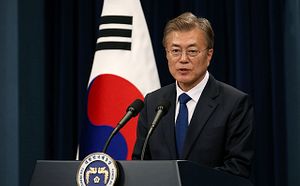The South Korean government has asked the United States to consider delaying the start of their annual springtime joint military exercises until after the Winter Olympics.
The 2018 Winter Olympics will take place in Pyeongchang, South Korea, in February. The annual Foal Eagle/Key Resolve U.S.-South Korea joint military exercises typically begin around that time, but the South Korean government is concerned about possible provocations from North Korea as the exercises begin.
“It is possible for South Korea and the U.S. to review the possibility of postponing the drill,” South Korean President Moon Jae-in remarked during a television interview on Tuesday. Moon clarified that the delay would only be possible should North Korea refrain from additional missile and nuclear tests in the meantime.
North Korea has carried out 23 separate ballistic missile launches and one test of what it claimed was a high-yield thermonuclear bomb in 2017. In 2016, it carried out 24 ballistic missile launches and two nuclear tests.
“I have made such a suggestion to the U.S., and the U.S. is currently reviewing it. It all depends on how North Korea behaves,” Moon said, emphasizing that the delay would be conditional on North Korean behavior.
Dates for the 2018 springtime joint military exercises have not yet been announced. The Foal Eagle exercise involves field training and the large-scale mobilization of troops from both South Korea and the United States; North Korea sees these exercises as a rehearsal for war.
Like the late-summer/early-autumn Ulchi Freedom Guardian exercises, Key Resolve is a computerized command post war game, allowing U.S. and South Korean forces to practice wartime command and control under a variety of scenarios on the Peninsula. More than 300,000 troops from both sides participate in these exercises.
If the delay is accepted by the U.S. side, the exercises would likely begin after the conclusion of the Paralympics in late-March 2018. “We, as allies, are committed to an alliance decision on the exercises and will announce the decision when appropriate,” U.S. Force Korea told the Washington Post in a statement.
Next year’s Foal Eagle exercises will be the first to feature large-scale troop participation from both the United States and South Korea, since North Korea first tested its intercontinental-range ballistic missiles in 2017. It tested the Hwasong-14 for the first time in July and the Hwasong-15, a larger, more capable missile, in late-November.

































